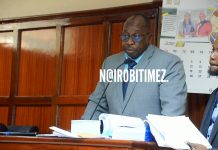 Kalenjin Council of Elders lawyer William Arusai, David Matsanga lawyer Waithaka Nguruiya(center) and Political Activist David Matsanga outside Milimani law courts after court directed it will rule on January on whether a suit filed by Matsanga seeking orders to reopen Justice WAKI secret envelop to be made public will be heard by a number of uneven judges.
Kalenjin Council of Elders lawyer William Arusai, David Matsanga lawyer Waithaka Nguruiya(center) and Political Activist David Matsanga outside Milimani law courts after court directed it will rule on January on whether a suit filed by Matsanga seeking orders to reopen Justice WAKI secret envelop to be made public will be heard by a number of uneven judges.
BY SAM ALFAN.
High court will determine whether to institute a three judge bench in an ongoing suit filed by activist David Nyekorach Matsanga and human rights crusader John Muiruri seeking to have waki envelope be opened in public next Month.
Justice Isaac Lenaola directed parties who said they have entered into a consent over the issue of three judge bench to come back on January 22 for the ruling.
“I will deliver the ruling on January 22 on whether the matter will proceed to three judge or one judge to hear the matter” said Lenaola.
Matsanga claims that he has already gathered enough evidence to show that the witnesses who were to testify in International Criminal Court (ICC) case had been compromised.
It is evidence even from Gatundu South MP Moses Kuria that the witnesses were paid to provide wrong evidence at the court.
Lawyer William Arusai for Kalenjin Council of Elders said the constitution under Article 165 (4) of the constitution says, any matter certified by the court as raising a substantial question of the law should be head by more than one judge.
Article 165 (3) (b) or (d) says “The matter shall be heard by an uneven number of judges, being not less three, assigned by the Chief Justice.
Last month High Court enjoined Kalenjin council of elders in a suit seeking to compel Justice Philip Waki to reveal the contents of the secret envelope have urged the court to allow them to participate.
Justice Lenaola enjoined Kalenjin council of elders on the suit after he allowed the application saying their application raises weighty issues that needs to be addressed by the court concerning justice WAKI secret envelope which mentioned the community.
This after the elders moved to court seeking to be enjoined in a case filed by Ugandan scholar seeking to compel Justice Philip Waki to reveal the contents of the secret envelope.
Lawyer William Arusai for Kalenjin council of elders welcomed the court ruling saying the community will be finally heard.
The applicants have raised substantial issues of law which they want the bench to hear.
“Kalenjin as a community feel aggrieved in a sense was advisedly mentioned without being given a hearing in the issue touching post election violence” Said lawyer Arusai for Kalenjin elders said.
Mr Arusai said,the report made various assertions against the community which have the effect of belittling, defaming and prejudicing the entire community.
The office of International Criminal Court Prosecutor Fatou B. Bensouda has replied to the High Court of Kenya request to participate in court proceedings seeking to have the contents of the Waki envelope made public.
“Kenya High Court has no jurisdiction over my office or ICC as a whole” said Bensouda in her letter.
Bensouda through her letter to Kenya Ambassador to Netherlands Ms Rose Makena Muchiri says her office won’t and will not participate on High Court proceeding’s as requested through Chief Justice Willy Mutunga.
“My office won’t will not participating in High Court of Kenya proceedings” Bensouda says in her letter.
Bensouda used Emissary tactic to respond to the High court request under what is viewed as a way of avoiding to respond to the court directly that requested her office to participate to the proceedings.
The prosecutor claims that the office of the prosecutor enjoys immunity under both International and Kenyan law privileges and immunity.
Immunity from legal process is similarly accorded to the court’s official and staff under Article 48 of Rome Statute and Article 9 A of the Kenya privileges and immunity Act”. Say Bensouda.
David Nyekorach Matsanga through his petition, he sought High court to issue an injunction to direct or compel the office of prosecutor of International court to take certain measures on the matter.
“The community was adversely mentioned in the report by the Commission of Inquiry into Post-Election Violence (CIPEV) which was chaired by Justice Philip Waki but their response, which is a requirement in law, was not sought before the report was published,” said lawyer Arusei.
He said the community should have been allowed to defend itself against the allegations made. According to the elders, unless the allegations are challenged, the past, present and future generations of the Kalenjin nation will suffer prejudice in Kenya and elsewhere.
The request has however been opposed by Attorney General through senior state counsel Njoroge Mwangi who said that the elders have not demonstrated the different contribution they will bring into the case which will not be addressed by the parties already in the case.
The court was also told that allowing the welfare association to participate will amount to duplication given that some of the issues they seek to rise, already form the substance of the case.
Mr Matsanga filed a petition to compel the government and the International Criminal Court to make public the contents of the Waki Report. He said that he has filed a case at The Hague-based court and needs the report to advance it.
The Waki report was presented to President Mwai Kibaki and Prime Minister Raila Odinga in October 2008.
The commission then gave an envelope containing the names of alleged perpetrators of the violence to Mr Kofi Annan, who brokered a power-sharing agreement between Mr Kibaki and Mr Odinga.
The names were finally handed over to Luis Moreno-Ocampo in early 2009, the then chief prosecutor at the ICC, after Parliament rejected an amendment Bill for a special tribunal to try the suspects.
The fate will be known on 27 of January 2016 when high court is expected to deliver the ruling on the matter.






